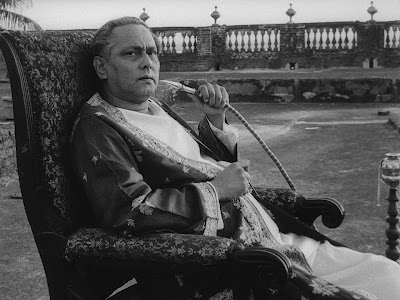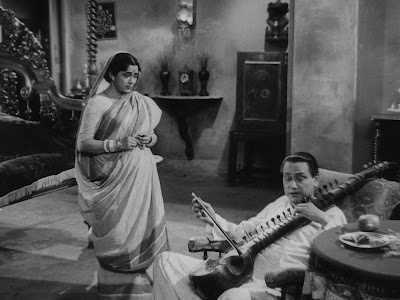Genre: Drama
Director: Satyajit Ray
Starring: Chhabi Biswas, Padmadevi, Pinaki Sengupta, Gangapada Basu, Tulsi Lahiri
Duration: 100 min.
Summary:
Traces the deteriorating life of an old country nobleman. He lives in
the past, in a slowly decaying villa, and cannot adjust to the
fast-changing, vastly different
modern world that
surrounds him on all sides. Melancholy and inward-turning, he remembers
the grand old days of societal soirees and political power and
mourns the death of his wife and his son, deaths which he survived only
to live alone in a house filled with memories.
The Music Room is a film from Bengali director Satyajit Ray. It is based on the short story titled Jalsaghar by Tarasankar Banerjee. The story is set in 1930's Bengal, on the once grand estate of Biswambhar Roy (Chhabi Biswas), an aging and lonely feudal landlord with a deteriorating fortune. His family perished at sea, and his lands and income long swallowed up by floods and the abolition of the old zamindari system. Roy longs for the old days and spends what funds he has left on the one thing that gives him enjoyment, music.
Ray delivers an outstanding take on this age old premise of changing times and the failure to adapt to them, helped by the simple but evocative cinematography, a remarkable performance from Chhabi Biswas, and the amazing music scenes performed by some of India's greatest musicians from that era.
There is a balance between beauty and decay shown in the images of Roy's crumbling palace. The music room itself is a marvelous space, lit by an ornate swinging chandelier, held up with large columns, and decorated with plush oriental rugs, antiques, and life sized portraits of Roy's ancestors. But at the same time when you look closely there are signs of deterioration and disrepair, walls are discolored by dust and smoke, the columns are scarred with patches of erosion, and the rugs are worn and faded.
At the center of all this is Biswambhar Roy himself, played with impressive range by Chhabi Biswas. He's first introduced to us as a tired and old man sitting alone atop his terrace puffing on a hookah. A pathetic remnant of the man he once was, so lost in his misery he has to ask his servant what month it is. Soon we get a flashback to an earlier happier time, Roy arrives at the palace astride a white stallion, we can see the beginning of the end even then, the fountain is dry and outside walls are weathered. However, the man in front of us now is a lordly and confident individual clearly at ease with his surroundings. The charisma of Chhabi Biswas shines through, especially in his interaction with rival neighbour Ganguly (Gangapada Basu), the son of a money lender who in contrast is shown as a person uncomfortable with his new riches. Roy is a symbol of an old and decadent lifestyle that we shouldn't sympathize with but we do because of Biswas' acting and the one aspect of his character central to the entire film, his love of music.
Three mesmerizing concert scenes take place in the film's title room. The performances themselves are a sight to behold, the most impressive of which is the final one featuring a hypnotic dance by the alluring Roshan Kumari. But these aren't indulgent Bollywood style interludes, these scenes play an important part of the narrative, and with Ray's superb direction each one provides a different dramatic feel. We see perfectly through body language and some not so subtle symbolism (placed there I believe in case we are transfixed by the music), the change in Roy's character and also the evolution of the relationship and rivalry between him and Ganguly.
Recently restored by The Criterion Collection, The Music Room looks and sounds sharp, but does however show a few signs of its age, with some scratches and scuffing and black and white flickering. Still it is an exquisite example of Indian cinema, and a fine introduction to Satyajit Ray who I definitely will be seeking more of in the future.
— Bonjour Tristesse





























11 comments:
Ray was a fantastic director, and this is now on my list!
I like the movie. It's neat! :D
This is one I probably wouldn't have thought twice about if I ever came across it. It's now one I'd really like to see. I think I'd enjoy this one for different reasons than other movies you post about.
I'm eager to see this film as I had never seen anything by Satyajit Ray. I only heard of him through Wes Anderson's "The Darjeeling Limited". I'm going to go for a blind-buy when the next Criterion DVD sales comes in November.
I don't know much about old movies, but this looks pretty cool.
Is it just me or do the words 'deteriorating life' apply to a lot of the protagonists of these movies haha?
Can you recommend any of his other work?
This was my first Ray film and I think this would be a good choice for a blind buy.
Yes I suppose that is a common theme with filmmakers, and one that also interests me.
You should watch Shatranj ke khilari (the chess players). It's very interesting. In my opinion, the architecture and the metaphors of happy/careless and sad/concerned households are outstanding. Also, the protagonists' path from a "world of their own" to reality is both visually well represented and conceived with the plot.
Hi M. Thanks for the suggestion, it sounds like my kind of film. Will try and see if I can locate it.
Post a Comment